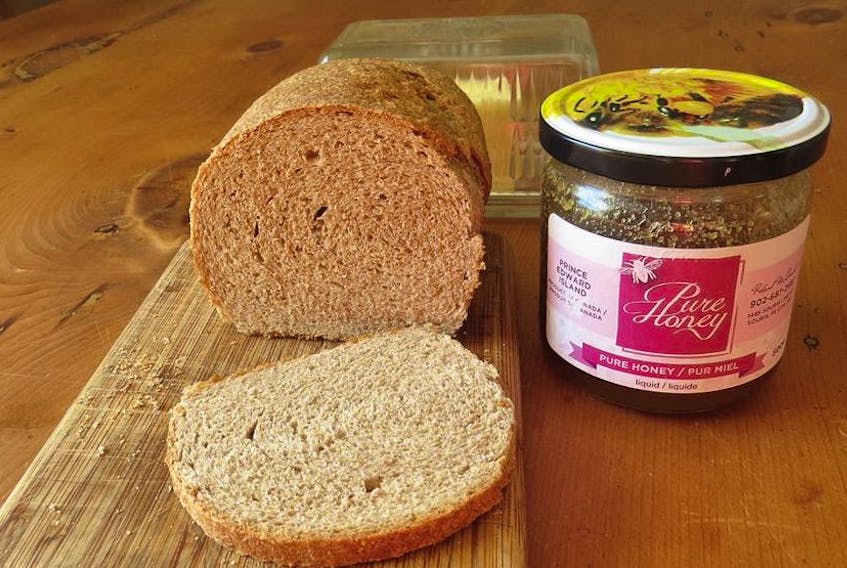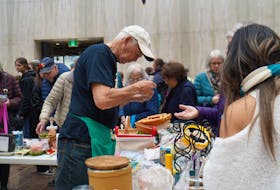
White bread isn’t always the bread of choice. Today’s recipe is for loaves made with 100 per cent whole wheat flour, no white flour added.
I had a request for a recipe for whole wheat bread – “the more whole-wheat and fibre the better, a heavy flavourful healthy bread”. That is what I made last week.
Whole wheat flour contains more fibre and nutrients than white flour, and whole wheat bread, especially homemade whole wheat bread, has a heavier texture and more intense flavour than white bread.
Gluten is a protein that allows yeast breads to rise, and whole wheat flour contains less gluten than does white flour. Because it is elastic, gluten stretches to accommodate the bubbles of carbon dioxide gas produced by yeast, increasing the volume as the dough rises and the bread bakes. When there is less gluten, more of the bubbles burst, so that the dough can’t expand as much.
Therefore, bread made with only whole wheat flour is often more dense, with a compact texture.
Numerous recipes call for a combination of whole wheat and all purpose or bread flour, to take advantage of the extra gluten in the white flour. Others use a different method for preparing 100 per cent whole wheat bread, the sponge technique, to permit the flour to absorb more liquid and give the yeast a head start of at least two hours, and sometimes overnight, before kneading.
Still others utilize dough enhancers such as vital gluten (a gluten supplement to add to the mixture), ground ginger or potato water. I’ll be experimenting with these strategies as soon as I get more whole wheat flour.
The following recipe uses none of these strategies to make a lighter larger whole wheat loaf. It makes two loaves of whole wheat bread that I believe fulfil the request for a heavy, flavourful, healthy bread.
Since whole wheat flour absorbs more liquid than white flour does, knead in the flour in small increments to avoid making the dough too dry. Bread recipes often specify a range of amounts of flour because the amount of moisture it contains varies depending on the humidity in the kitchen and how and where it has been stored. Also, be patient when making whole wheat bread; it takes longer to rise than white bread does.
I like this bread sliced thin, toasted and spread with butter and honey. I have put a picture of it at Facebook.com/IslandGusto.
Whole Wheat Bread
From Gill, Janice Murray: Canadian Bread Book, McGraw-Hill Ryerson Limited, Toronto, 1980
- 15 mL (1 tbsp) dried yeast
- 5 mL (1 tsp) sugar
- 250 mL (1 cup) lukewarm water
- 75 mL (⅓ cup) light brown sugar
- 250 mL (1 cup) scalded milk
- 10 mL (2 tsp) salt
- 30 mL (2 tbsp) butter
- 1.25-1.5 L (5-6 cups) whole wheat flour
Proof the yeast with the white sugar in the warm water.
Add the brown sugar, salt and butter to the scalded milk and stir to melt the butter and dissolve the sugar. Let stand till lukewarm and check the temperature before adding the yeast mixture.
Stir and add about one-third of the flour and beat very well indeed. After several minutes vigourous beating, add more flour until a soft dough is formed which cleans the sides of the bowl.
Turn out and knead well, adding more flour to prevent sticking. Knead until dough is elastic. It will not have the satiny feel of white dough but should have real snap and spring. Place in greased bowl, cover tightly (this dough dries out even faster than white dough) and leave to rise till double.
Punch down, knead a few turns and shape into two loaves. Place in greased loaf pans and brush with melted butter or shortening. Cover with tea towel and let rise until just very slightly more than double. (This is a bit difficult to judge, but the tops should be rounded and the dough should fill the pans.)
Bake in 200 C (400 F) oven for 10 minutes; reduce heat to 190 C (375 F) and bake 35 minutes more, covering the crust with a loose piece of foil during the last few minutes if it seems to be getting too brown. Turn out and cool on racks.
Makes 2 loaves
Margaret Prouse, a home economist, can be reached by email at [email protected].









